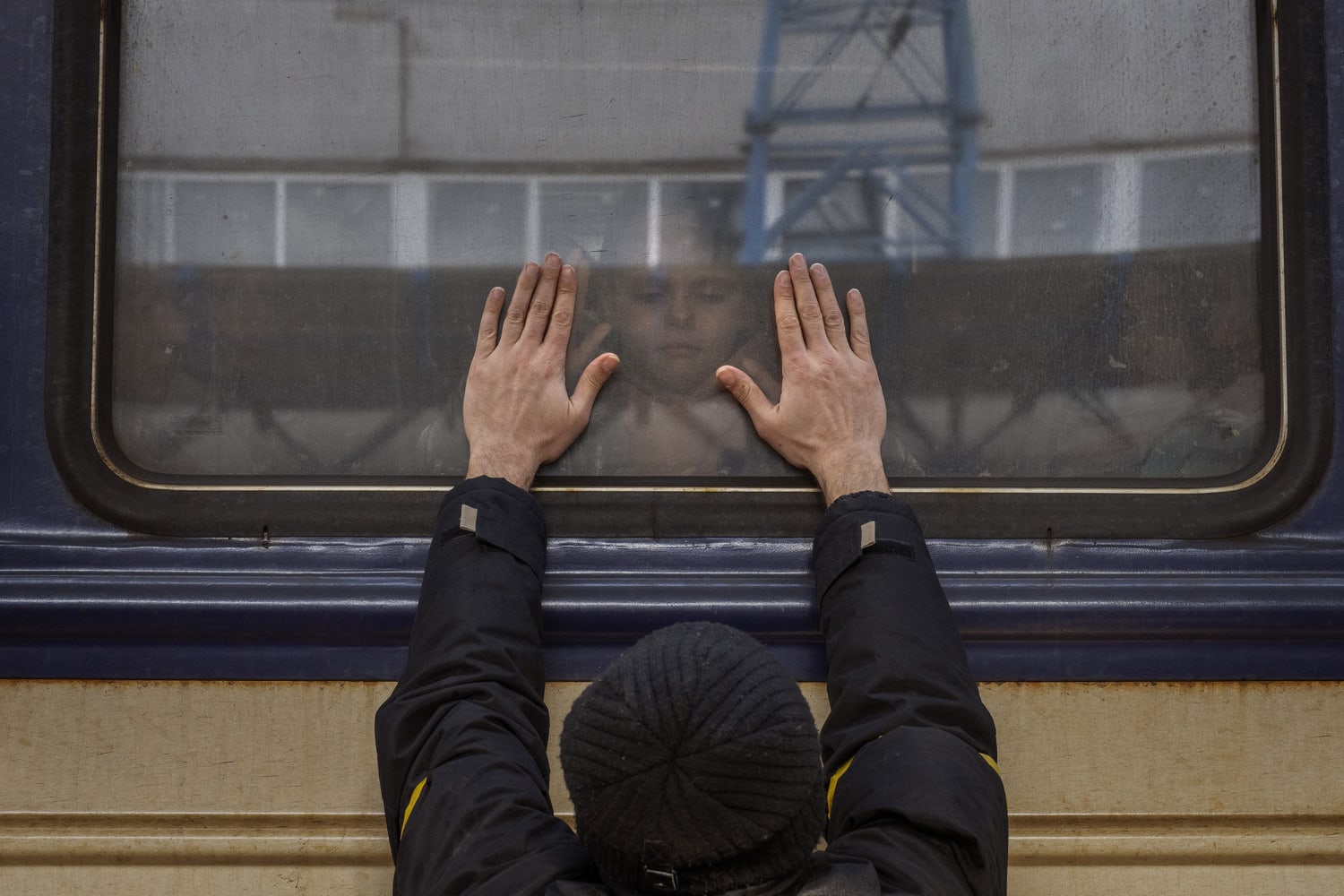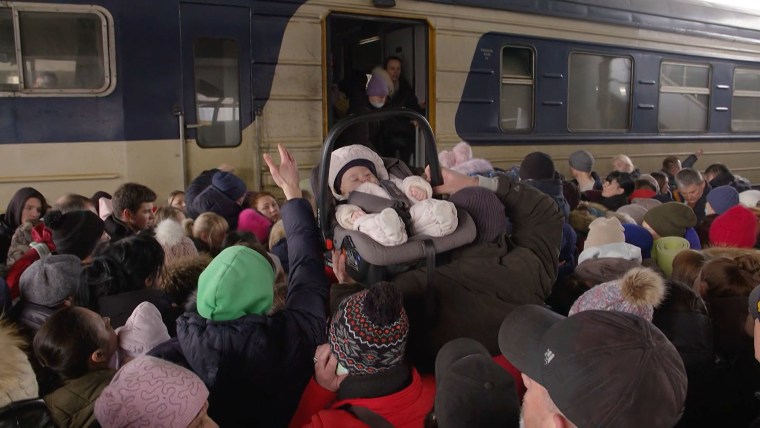“In the peaceful time, we are the backbone of the economy,” Alexander Kamishin, who is in charge of the Ukrainian railway system, said. “In the wartime, we are the backbone of security.”
At the main train station in Kyiv on Friday, crowds of women holding children bundled up against the cold kissed the men they were leaving behind to fight the Russian forces.
“Kids screaming, mothers screaming, it’s so crazy this panic,” Konstantyn Makarin, a 45-year-old circus acrobat, told NBC News correspondent Richard Engel. “People are so afraid.”
Earlier this week, the Ukraine State Border Guard Service announced that men ages 18 to 60 were prohibited from leaving the country after President Volodymyr Zelenskyy declared martial law.
So it was just women, children and the elderly pushing their way onto the trains for Lviv. And every time a track was announced, the crowd made a mad dash for the train, sometimes clambering over the tracks.
“They’re trying to cram as many people as possible on this train,” Engel reported. “It feels like we’ve stepped back into World War II.”
Lviv, Ukraine
When the air raid sirens went off in Lviv on Friday, there were thousands of people huddled inside the main train station and there was no place for them to hide.
So the crowd, mostly women carrying babies or holding their children’s hands, with all the possessions they could grab in wheeled bags, ignored the sirens and continued chattering. But there was “desperation in their eyes,” NBC News producer Paul Goldman reported from the scene.
Meanwhile, Nate Mook of the World Central Kitchen had set up shop near the train station and was trying to feed and comfort as many people as he could.
“It’s really heartbreaking to watch what’s happening as families are having to flee their homes, abandon their lives,” he said.
The refugees arriving in Lviv on Friday were mostly from Kharkiv, where some of the fiercest fighting has taken place.
“As you can see, a lot of small children are here, a lot of infants, a lot of babies,” he said. “It’s freezing cold outside. So it just gives them a spot to kind of regroup and they get a hot meal, they can catch their breath, figure out what’s next.”
Korczewo, Poland
One of the Ukrainian refugees who arrived in this border town Friday was a 64-year-old named Anatoly who was carrying a bag of clothes and a guilty conscience.
Weeping, Anatoly told NBC News producer Konstantin Shukhnov that his village of Borodyanka, northwest of Kyiv, had been attacked several days ago by Russian tanks while he was visiting a friend.
He said his wife had taken shelter in the root cellar of their home, but it was inadvertently bombed by Ukrainian fighter planes that chased off the Russians.
Anatoly said when he got to the house, he realized his wife was buried somewhere beneath the ruins. But when he saw the Russians coming back, he took off running.
“I left my wife and I have no idea if she is dead or alive,” Anatoly said.
Krakow, Poland
Ukrainians who were able to get out say the idea of not knowing what to do next has been torture.
Olga Tsoi, a Ukrainian American from Chicago, was visiting her family in the city of Kherson and said it took her 72 hours to reach the Polish border.
Now ensconced in a Krakow hotel, she had nothing but praise for her Polish hosts but said she feared for her family in Kherson, which is now in Russian hands.
“Everybody is really worried what’s going to happen next because they are running out of food, and right now it’s not safe to get outside and go to a store,” she told MSNBC’s Chris Jansing.
Tsoi said she is trying get her mother out of Kherson but there “doesn’t seem like there’s a clear passage to get my mom to the United States since she doesn’t have a residency or visa.”
William Shaw, an American expat living in the ancient Polish city, told MSNBC he has taken in several Ukrainian refugees, and that across Poland, “there’s a rush of goodwill.”
Poland has taken in nearly 650,000 Ukrainian refugees, according to the most recent U.N. figures, half of the 1.2 million people who have fled the country.
And the country was already sheltering close to 2 million Ukrainians who arrived in 2014 after Russian President Vladimir Putin’s forces seized the Crimean Peninsula.
Asked if Poland can take many more Ukrainians, Shaw said, “absolutely not.”
“And that’s probably what Putin wanted, but we’re going to do our best,” he said.
Source: | This article originally belongs to Nbcnews.com











